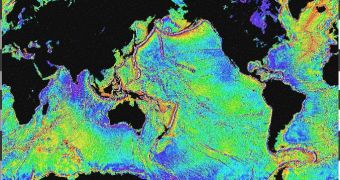NEPTUNE Canada, a University of Victoria-led initiative, will be the largest cable oceanic observatory ring in the world. Scheduled to be completed in a few months, the construct will allow for gathering oceanic data straight from the source over the next quarter of a century, its creators say. The structure is located off the coast of British Columbia, and experts around the world praise it as the most complex and advanced cabled observatory ever constructed.
Over the next 40 to 50 days, engineers and project scientists will install five 13-tonne nodes on the ocean floor, as well as more than 400 instruments and sensors, which will all be interconnected by a large loop of powered fiber-optic cables, set in place since 2007. The main advantage that the new structure has over others of this kind is the fact that it makes use of the Internet and the high transmission power of fiber cables so as to provide the control center with real-time information on a vast array of events and processes unfolding in the North Pacific.
Scientists in many fields of research are excited about the project, because it will essentially enable them to perform rigorous, deep-sea experiments, without having to leave their offices, and pay vast sums of money for organizing perilous expeditions. “This is truly transformative science. At a time when our understanding of the oceans is clearly becoming more essential than ever, NEPTUNE Canada will play a leadership role in advancing our knowledge of the oceans in ways not previously possible. We are launching a new era of ocean exploration,” the President of the University of Victoria (UVic), Dr. David Turpin, says.
All the instruments and nodes that are part of the science project have been especially designed with the toughness of the ocean in mind. In addition to being able to withstand the vast pressures and low temperatures of the depths (2.6 kilometers below sea level), all of them are encased in trawler-resistant frames, which would basically ensure that fishermen do not harm the complex instrument loop.
“This extended cooperation with UVic in such an innovative and challenging project confirms our expertise and customer focus to address new market segments, such as scientific undersea observatories that can be highly beneficial to onshore researchers for real-time oceanic monitoring and scientific experiments,” Georges Krebs, who is the chief operating officer at Alcatel-Lucent's submarine network activity, the main contractor of NEPTUNE Canada, explains.
“Today's launch demonstrates Canada as a global leader in ocean research. With the launch of NEPTUNE Canada, scientists and researchers around the world will have real-time access to enormous streams of data, which will aid us in protecting our environment, supporting public safety and security, creating innovative new technologies and the jobs that go with them, and promoting research,” Mike Lake, the parliamentary secretary to the Canadian Minister of Industry, adds.

 14 DAY TRIAL //
14 DAY TRIAL //